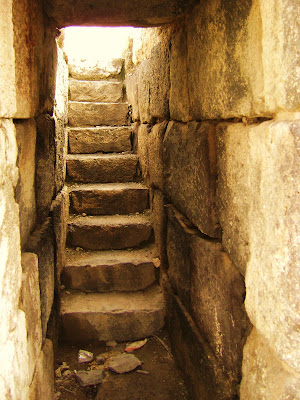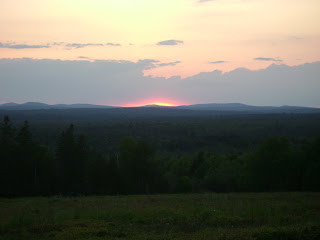In Psalm 78, Asaph contemplates passing on faith. He says: the things which our fathers have told us, we will not hide from our children; telling to the next generation what we praise God for; the amazing works He did for our parents and for us. We will make them known to our children that the generation to come might know them, that the ones yet to be born might tell their children,
that they may set their hope in God, and not forget the works of God.
Something Asaph thought necessary to pass on:
They spoke against God; they said, "Can God prepare a table in the wilderness? Can He give bread also? Can He provide meat for His people?"
This is an essential lesson that we must pass down to our children.
God can prepare a table in the wilderness. He can give bread. And He can provide meat for His people.
How will they learn to set their hope in God if they are not brought to see that God is not limited by wilderness resources?
I can't prepare a table in the wilderness, but
He can.
I cannot give the multitude bread, but
HE can.
I can't get enough meat to feed the family in places the animals run from, but
He can. We must not only set our hope on Him, we must tell our children about His works so that they will, too.
"They did not believe in God, and did not trust His salvation." Let this not be
our epitaph.
It says he
rained food down on them -- bread and meat. "In spite of this they still sinned, and did not believe in His wondrous works. Therefore their days He consumed in futility, and their years in fear."
Do you realize this is what comes of not believing God? Of refusing to hope in Him? All our days become futility and fear. Everything we do is useless -- like wandering for forty years in the desert, killing time until it kills us, because what He said we would not believe.
Fear. Through the fear of death, all their lifetimes they were subject to bondage.
Subject. Their necks were under the foot of fear. Their lives were being ruled by death because they would not hope in God. Christ came to deliver us from that. God is
our refuge and hope. Therefore will
not we fear though the mountains be removed and thrown into the sea.
The Psalm describes how often He forgave them, being full of compassion. He turned His anger away. But how often they provoked Him in the wilderness, and grieved Him in the desert. "Yes, again, and again they tempted God, and
limited the Holy One of Israel. They did not remember His power; the day when He redeemed them from the enemy." Does the word 'limited' jump off the page at you like it does me?
They limited God. This is why we tell our children what He
can do, what He
does do, and what He
will do.
Because unbelief limits God.
He would not take them into the land because they would not believe His promises. That entire generation died in the wilderness. And the wilderness will claim us, too, if He is not our hope.
Our goal as parents is that our children would set their hope in the Lord. That they will believe in Him, and trust in His salvation. That training sometimes requires a trip through the wilderness. So that they can see that He can prepare a table in the wilderness. He can give bread. He can provide meat for His people.
When I was a young teenager, my family was in a financial wilderness. There was not enough money to cover the bills, and my parents were scared. But my mom was in the habit of reading the Word to us in the mornings, and praying with us. After reading, we seven children would sit and she would distribute to us the needs we had to pray for. Because she let us see the wilderness, hear the Word, and participate in the requests to the Lord for provision, our faith was built up as we saw God answer. One morning my little brother, who was six or seven at the time, insisted that he wanted to pray for $1000. Mom kept trying to get him to just pray for the needs that we had, and the tug of war between them brought him to tears. Mom said, "Fine. It's okay if you want to pray for $1000." He bowed his head and asked the Lord to send us $1000. We all indulgently waited through his prayer. That day in the mailbox there was a check for $1000.
It was humbling. The Lord prepared table after table after table for us, and it wasn't because of our great faith.
He cares for us. And our children need to see that. They need to see me trusting Him with nothing. They need to understand that HE IS OUR HOPE AND OUR REFUGE. So they can teach their children, too.
I was talking with a lady last night who is 87 years old. A man asked her how long she had been walking with the Lord. She told us that she had believed in Jesus when she was 11 years old. Her mother had been very sick, and they thought she would die, so she had to go live with her grandmother. Her grandmother had to tell her about her mother's condition, and when she sat down with her, she told her about Jesus. She told her about who He is, and about His love and His power. Her grandmother taught her to pray. And the Lord spared her mother's life. When we sit down to break the news of death and destruction and loss and wilderness to our children, let it be accompanied with hope in the Lord. With the truth about who He is, and what He's done before. So that when our children are 87 years old, they can tell someone new what God has done.
"I call to remembrance the unfeigned faith that is in thee, which dwelt first in thy grandmother Lois, and thy mother Eunice; and I am persuaded that in thee also." (2 Timothy 1:5)






























